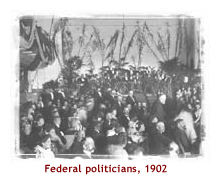|
The carve up The Commonwealth and the States have always argued with each other over the distribution of resources. As the Commonwealth has assumed more and more of the revenue raising, the way in which the cake has been carved up has changed.  Since
Federation there has been a strong trend towards centralisation of financial
power. In 1901 the Commonwealth raised nearly 60% of all revenue through
tariffs and excise while spending less than 15% of money raised. The remainder
was transferred directly to the States. In 2001 the Commonwealth will raise
more than 75% of the revenue and account for nearly 60% of the spending. Since
Federation there has been a strong trend towards centralisation of financial
power. In 1901 the Commonwealth raised nearly 60% of all revenue through
tariffs and excise while spending less than 15% of money raised. The remainder
was transferred directly to the States. In 2001 the Commonwealth will raise
more than 75% of the revenue and account for nearly 60% of the spending.The transfer of responsibility for income taxation to the Commonwealth in 1942, a measure necessitated by the Second World War, was a major reason for this alteration in financial power. It has resulted in what is known as 'vertical fiscal imbalance' - the difference between the amount of money collected by each level of government and the amount it spends. With State governments raising less than 25% of revenue but accounting for more than 40% of spending, they have become increasingly dependent on Commonwealth funding. More than half of State revenues are tied grants given by the Commonwealth with conditions and restrictions attached.  The
difference in the capacity of the States and Territories to raise revenue
to meet their spending needs is known as 'horizontal fiscal imbalance'.
Less well-off States have trouble maintaining the same level of government
services as other States and require extra funding from the Commonwealth.
Prior to the mineral boom of the 1960s Western Australia was one State which
required extra funding from the Commonwealth. The
difference in the capacity of the States and Territories to raise revenue
to meet their spending needs is known as 'horizontal fiscal imbalance'.
Less well-off States have trouble maintaining the same level of government
services as other States and require extra funding from the Commonwealth.
Prior to the mineral boom of the 1960s Western Australia was one State which
required extra funding from the Commonwealth.State governments negotiate with the Commonwealth every year over the allocation of government money. The Premiers' Conference is the main forum for financial policy, while a whole range of Ministerial and departmental meetings address practical issues involving the allocation of funding. |
Please note: The content on this website is made available for archival purposes and may not meet the State Library of Western Australia's current standards for web accessibility, mobile device compatibility, historical accuracy and cultural sensitivity.